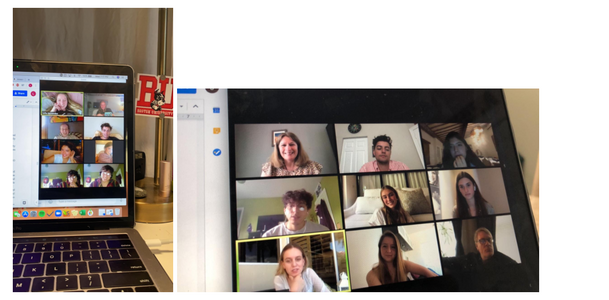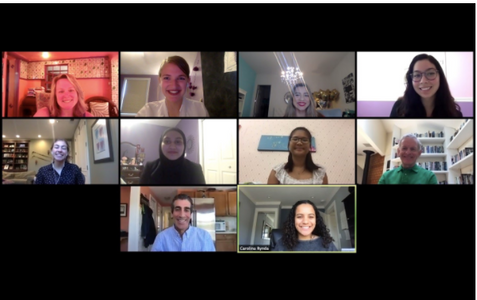Capping off CGS from around the world
Six weeks. Fifty pages. Five to six person teams. And this year — zero in-person meetings. Capstone has long been a rite of passage for CGS students, the culmination of their academic experience at CGS at the end of their sophomore year. But for this year’s class of sophomores, remote learning amid the Covid-19 pandemic presented a unique challenge to completing the project.
CGS students capped off their sophomore years by working in remote teams to research, write, and defend their Capstone projects, which challenge students to confront and propose solutions to real world challenges. As the world grappled with the Covid-19 pandemic, CGS students addressed relevant issues, from federal government ethics reform to learning from China’s Covid-19 containment strategies to prepare for future pandemics.

To select their topic, each group of students chooses from a list of prompts that touch on a wide array of topics. Faculty create a different list of topics for each team.
On Team W, Kristen Berg’s group focused on how to provide incentives to promote drug research and development.
“My team decided to focus on antibiotic research and development because there is currently a worldwide emergency relating to antibiotic-resistant bacteria and the lack of effective antibiotics that are available. It was a very complex and multifaceted topic to address, but one that is very relevant to the current state of affairs,” Berg said.
Alexis Gomes, a student on Team W, said that her group chose to write about racial discrepancies in the U.S. maternal mortality rate because the group was interested in both medicine and policy.
While addressing these timely topics, students grappled with the challenges of working in remote teams, managing conflicting schedules and difficult technology to get the job done.
Seb Lancaster, who was on Team S, said that producing a cohesive paper was a challenge due to not being able to work together in person.
“Writing a 40 page paper with a group of people, the majority of whom I hadn’t had the chance to get to know in person, came with many complications. All of us had unique writing and working styles, which made developing a cohesive paper/argument difficult, especially through Zoom,” Lancaster said.
Some teams had members who were spread out across the world. On Team T, students worked from Korea and Crimea to Colorado and California.
Camryn Brits, whose Team Y Capstone group wrote about voter suppression in Georgia, said her team adapted by finding a weekly call time that worked for everyone, and filling people in if they couldn’t make the call.

The pandemic meant that many students faced unique challenges outside of their school responsibilities. Team U saw its students dealing with quarantine regulations, unsteady access to the Internet, and personal challenges.
Professors from Team U said that they were made aware of a variety of problems that students faced, including personal and family issues directly related to Covid-19. In all cases, professors said teams rose to these challenges, pitching in to support their classmates and ensuring the projects were completed on time.
Once the Capstone papers were written, students faced the prospect of completing the two hour oral defense via Zoom.
Avithej Reddy, a student of Team Y, wrote about a hypothetical trial of Edward Snowden, addressing issues of democracy and security in the U.S.
“The oral defense was definitely awkward at times,” he said. “Someone may have accidentally talked over someone else, or someone’s connection may have frozen in the middle of their speech, or people would disconnect due to WiFi issues. It was tough trying to get it all together. I would say it might have even been more challenging than the actual research aspect.”
According to Professor Robert Wexelblatt, CGS students’ Capstone projects were a testament to their drive and resilience in the face of unforeseen challenges.
“A great deal of credit is owed to the students who, with determination and without complaint, went about their task, working together amicably and with flexibility,” Wexelblatt said. “The problems we anticipated turned out to be imaginary; they simply did not arise. It’s an impressive achievement.”
— By Natalie Seara